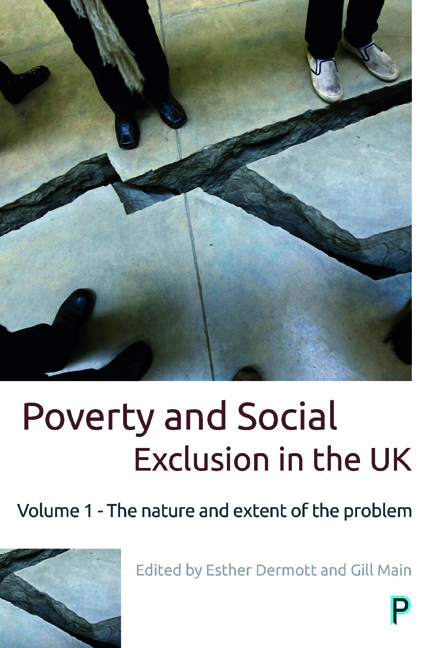Book contents
- Frontmatter
- Dedication
- Contents
- List of tables and figures
- Notes on contributors
- Acknowledgements
- Introduction: poverty and social exclusion in the UK
- One Measuring poverty in the UK
- Two The impoverishment of youth: poverty, deprivation and social exclusion among young adults in the Uk
- Three Improvement for some: poverty and social exclusion among older people and pensioners
- Four Which men and women are poor? Gender, poverty and social exclusion
- Five Better understandings of ethnic variations: ethnicity, poverty and social exclusion
- Six Improving lives? Child poverty and social exclusion
- Seven The cost of children: parents, poverty, and social support
- Eight A worsening picture: poverty and social exclusion and disabled people
- Nine Devolution and North/South division: poverty and social exclusion in the countries and regions of the UK
- Ten More similarities than differences: poverty and social exclusion in rural and urban locations
- Conclusion: innovating methods, informing policy and challenging stigma
- Technical appendix
- Index
Conclusion: innovating methods, informing policy and challenging stigma
Published online by Cambridge University Press: 08 April 2022
- Frontmatter
- Dedication
- Contents
- List of tables and figures
- Notes on contributors
- Acknowledgements
- Introduction: poverty and social exclusion in the UK
- One Measuring poverty in the UK
- Two The impoverishment of youth: poverty, deprivation and social exclusion among young adults in the Uk
- Three Improvement for some: poverty and social exclusion among older people and pensioners
- Four Which men and women are poor? Gender, poverty and social exclusion
- Five Better understandings of ethnic variations: ethnicity, poverty and social exclusion
- Six Improving lives? Child poverty and social exclusion
- Seven The cost of children: parents, poverty, and social support
- Eight A worsening picture: poverty and social exclusion and disabled people
- Nine Devolution and North/South division: poverty and social exclusion in the countries and regions of the UK
- Ten More similarities than differences: poverty and social exclusion in rural and urban locations
- Conclusion: innovating methods, informing policy and challenging stigma
- Technical appendix
- Index
Summary
The preceding chapters of this volume have detailed the ways in which poverty and social exclusion are very real and large-scale problems in the UK today. They have also examined the subtle variations in vulnerability to poverty and the impact poverty has on different groups within society. But the aim of this book – and of the 2012 Poverty and Social Exclusion Survey (PSE-UK 2012) research as a whole – is not simply to document poverty in the UK, but to challenge its prevalence and offer practical insights into how policy and practice may best work towards its end. As Piachaud (1987) enjoins us, any study of poverty must aim to change attitudes and social actions, if it is to be part of the solution and not part of the problem. As noted in the title, here I draw attention to three specific ways in which the PSE-UK 2012 in general, and this volume in particular, might contribute to achieving this aim:
•Innovating methods: accurate measurement of poverty is vital to its eradication. We do not claim that the PSE-UK 2012 is a panacea; but it does represent the latest developments in the field. These developments have built on work conducted by the founders of the consensual approach (Townsend, 1979; Mack and Lansley, 1985), and have depended upon the rigour of its critics (for example, Piachaud, 1987). Furthermore, the large sample size of the PSE-UK 2012 has enabled the fine-grained analysis of different population groups presented in this volume. While methodological developments will continue, an increased awareness of the groups within society which face the highest vulnerability to poverty, and the impacts of poverty on different groups, can only help in understanding and combating the problem.
•Informing policy: the ways in which poverty is conceptualised, defined and measured within the policy environment, and its prioritisation within policy agendas, are greatly variable over time. Significant changes in both the conceptualisation of poverty and its prioritisation as a social problem are evident in recent history, as detailed below. Studies such as the PSE-UK 2012 can help to inform policy approaches through testing the assumptions they draw on about the nature, causes and effects of poverty, and can help to promote its inclusion as a policy priority through highlighting the extent and nature of the problem, overall and for specific subpopulations.
- Type
- Chapter
- Information
- Poverty and Social Exclusion in the UK Vol 1The Nature and Extent of the Problem, pp. 239 - 256Publisher: Bristol University PressPrint publication year: 2017



